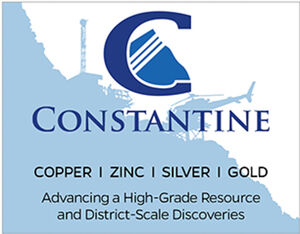WOTUS ruling hailed as a win for Alaska
Unanimous SCOTUS decision against Biden administration's waters of the U.S. shrinks federal CWA jurisdiction in Alaska North of 60 Mining News – June 2, 2023
Last updated 6/15/2023 at 3:22pm

Adobe Stock
The Parks Highway cuts across some of Alaska's more than 175 million acres of wetlands. A broader WOTUS definition meant increased federal regulatory requirements for commercial and residential development by Alaskans.
Alaska Gov. Mike Dunleavy and trade groups representing a broad spectrum of businesses across the state hailed the unanimous Supreme Court decision against the Biden administration's broad definition of "waters of the United States" as a major win for Alaska.
"This is a huge win for Alaska," said Rebecca Logan, CEO of the Alaska Support Industry Alliance. "The Biden WOTUS led to massive uncertainty and more burdensome regulations."
Basically, anything considered waters of the United States, or WOTUS, falls under the jurisdiction of the federal Clean Water Act.
This transfer of authority away from states is especially profound for Alaska, which hosts 174 million acres of wetlands, or roughly 43% of the state's surface area.
Mining, road construction, pipeline and utility installations, and commercial and even residential construction have been impacted by an expanded WOTUS definition.
"The court made the right call in limiting federal jurisdiction over wetlands and placing decision-making power back in the hands of States," said Alaska Gov. Mike Dunleavy. "This ruling stands to promote the kind of responsible development my administration is working to bring to Alaska."
SCOTUS rules in favor of Sacketts
WOTUS has been a concern for Alaska since the Obama administration put in place a definition to significantly expand the geographic scope of U.S. waters in 2015.
Obama-era WOTUS was dismantled by former President Trump and then was reworked and reinstated by the Biden administration in 2022.
While the revived WOTUS had outsized implications for Alaska and its economy, this massive federal regulatory expansion was brought down by Chantell and Michael Sackett, an Idaho couple who challenged federal regulators' claims of oversight of wetlands on their property.
Alaska joined nearly two dozen other states concerned about WOTUS expansion in support of the Sacketts.
In a friend-of-the-court brief, Alaska Attorney General Treg Taylor argued that an expansive WOTUS definition exceeded the authority granted to the federal agencies under the Clean Water Act.
The Supreme Court agreed and handed the Sacketts a unanimous win that extends well beyond the Idaho couple's property.
"The State of Alaska has been in a non-stop fight to limit federal overreach since the start of the Biden Administration," said Taylor. "The clarity provided by this decision will help to end this unlawful federal expansion and bring certainty and predictably to Alaskan development."
The Resource Development Council of Alaska, which represents a broad spectrum of businesses in the state, agrees.
"For too long, federal agencies have illegally expanded the definition of 'waters of the United States' resulting in burdensome and destructive federal overreach of state and private lands," said Leila Kimbrell, executive director of the Resource Development Council for Alaska. "The recent Sackett decision affirms this, appropriately limits federal authority under the Clean Water Act, and should also reverse the overly expansive WOTUS rule issued by the administration in late 2022."
Alaska open for business
Largely modeled after waters of the U.S. definitions put in place while he was vice president, the WOTUS reinstated by Biden included anything that remotely resembled a stream – a bed, bank, and ordinary high-water mark – even gullies where water only flows during infrequent heavy rainfall events. Nearby waters, including wetlands and other watery features within 1,500 feet of navigable waters and sometimes such features within 4,000 feet of high tide or high-water mark of a stream, also would have been covered under the rule.
Even if a small portion of one of these neighboring wet features fell within the guidelines, the entire area was subject to "significant nexus" analysis under the new WOTUS rule, which extended Clean Water Act authority over the entire area, even if it is not connected to downstream waters.
With more than three million lakes, nearly a million miles of rivers, more coastline than the entire Lower 48 states combined, and 174 million acres of wetlands, Alaska has enormous swaths of land that would be considered significant nexus.
This would have impacted mining, roads, renewable energy projects, and even residential development.
"Rejecting the significant nexus test restores common sense and clarifies how WOTUS is implemented," said Alaska Miners Association Executive Director Deantha Skibinski. "Now the Biden Administration must revise its WOTUS rule and provide for a durable rule that clearly details waters that fall under federal jurisdictions versus those that will be regulated by the states."
Eliminating the ambiguity created by the significant nexus component will make it more obvious to Alaska businesses and residents what is considered U.S. waters.
"The Alaska Chamber is pleased to see the U.S. Supreme Court enforce the literal and figurative boundaries the EPA should have followed all along," said Alaska Chamber President and CEO Kati Capozzi. "This is a win for state's rights and private land ownership rights."
The contractors that build homes, businesses, highways, and energy projects across Alaska are especially impacted by WOTUS.
"The precise definition of WOTUS is fundamentally important to the construction industry," said Associated General Contractors of Alaska Executive Director Alicia Amberg. "The fluctuations in WOTUS regulations, case law, and implementation guidance throughout the years have impacted our members' ability to secure financing and approval to construct new projects or maintain existing infrastructure and facilities across Alaska. The Sackett decision provides the clarity needed to adopt a durable WOTUS rule that follows the intent of the Clean Water Act."
Gov. Dunleavy says the Supreme Court ruling in favor of the Sacketts means "Alaska is once again open for business."


















Reader Comments(0)